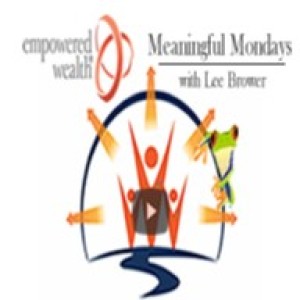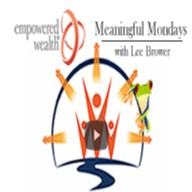Episodes

Sunday May 26, 2024
Cascade of Gratitude: Transforming the Diderot Effect
Sunday May 26, 2024
Sunday May 26, 2024
Good morning, everybody. Lee Brower here. Welcome to this edition of Meaningful Monday. I am grateful to be here. I am glad to be here. Have you ever heard of the Diderot effect? Few of you probably have. I had never heard about it until just reading recently, and I was able to link several things to it. So let's talk about where did the Diderot effect come from? It came from the 17th century from a man, French philosopher by the name of Denis Diderot. And what he did is he put together a book he called his encyclopedia, but had all All of the great philosophers, Voltaire, et cetera, brought together on how to run governments, how to put the, and it became well-known and kind of a guideline for a lot of the governments. And Catherine the Great saw it. She wanted to get it somehow. So happens that Diderot, after his fourth child, needed money. So she came in and bought it from him. She let him be the librarian for the rest of his life, but she was able then to access it and use it in her own governing and her enlightenment period going forward. word.
One of the things that he talked about later that he wrote about, he said, you know, it was really interesting because when I had that money, I thought, well, I need to buy something. So he said, and he went out and bought the most expensive gown that he could buy. They call it a gown back then. We'd wear it, you know, and it was silk. And once he had the gown, he said, well, I need some shoes. Can't wear these scrutty shoes with this. So he bought some nice shoes, but no, not just one pair, several pair. I need different colors to go in and I need other parts of my outfit, my leggings, my everything. So he just one thing bought another. And then he looked around his house. I need couch. How could I walk in like this when we got pretty furniture like this? And so this cascade of consumption, cascade of consumption starts to happen.
Has it happened to you? I think it's happened to all of us in some way. I mean, say you pick up a sport, you're going to golf. What happens is you don't just buy the clubs. Then you got to buy the outfit and then you got to do this outfit because this one is what this, and then you got to get the the right balls. And then this happens and you hear about this and you get a cascade of consumption. Buy a new car, things happen to it. Buy a new furniture, cascaded consumption. And so it's all arrows in because it forces you to think inward, not outward. So, you know, how can we turn that on its head? How can we use that to make ourselves better? How can we turn the arrows out with that?
So I think about things that have cascade of events. And I think about our son, Bo, that I've told you about before, how he went through a drive-through, came back and said, I got up there to pay and the car in front of me was already gone and he paid for my hamburger. I said, what'd you do? Well, I paid for the car behind me. You see, there's a cascade now of gratitude, not a cascade of consumption. I had an experience recently on the plane. It's little tiny things, you know. I mean, it's just little tiny things. Sitting there, and the guy's late getting on the plane, and he's kind of one of these guys. You could tell he's stressed out, and he's charging up the aisle and looks up. There's hardly any room. He crams baggies this way, crams baggies, shoves his bag up in there, sits down, plops down, and off we go. And I prejudiced him. I thought, this guy's kind of a jerk, you know.
And when we landed, guess what? He's the first one up, wrestles this thing down, puts it down on the aisle right where I can't get out of my seat. You've been there before, right? So you can't move. You're trapped in there. Then he takes his briefcase or backpack, and he's trying to slip it on the handles to stack it. They won't go. So he's, uh, uh. So I'm just sitting there, and I reach over like that, and I grab it, and I move things, kind of adjust it, lift it up. Give me a second. And slid it down for him. Didn't think anything of it. So then I'm sitting there and I'm trying, I want to get my jacket on before we get off. And so you're wrestling with your coat to get it on because you're, you know, you're crammed in that spot. So as I'm wrestling with it, all of a sudden I feel a hand come down and somebody tugs it up and pulls it up over my shoulder and pulls it back the other way. And it was this man and he had a smile. So when I got up, you know, I said, well, thank you very much. Thank you. And we get off the plane and he's standing there. He says, you know, I didn't thank you for your help. I just wanted to make sure that I said, thank you. A cascade of gratitude. What a difference. What a difference.
And I think there's so many times in our lives when we have the opportunity to create that cascade. And where other people have created a cascade for us where maybe we didn't even know who they were or they did something for us that we in turn did for somebody else. So here's my challenge for this week. I challenge us. I challenge you. I challenge me to create our own positive Diderot effects through gratitude. A cascade of gratitude. How's that? A cascade of gratitude. Start with one small, meaningful action that's aligned with the mindset, aligned with the arrows out mindset, and watch to see if it doesn't, and even if it doesn't, but just know that it is making an effect on other people's lives. So the empowering question, what small action can I take today that will create a ripple of positive change? Maybe even a cascade of gratitude. Have a meaningful week. Live life deliberately. We'll talk next week.


No comments yet. Be the first to say something!